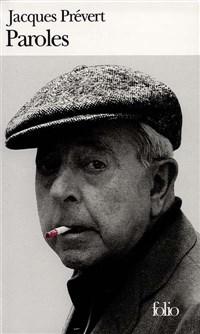Dominique Tezgör, Professor, Departments of Fine Arts and Archaeology
BY MELİS ERDEM (ARCH/III)
 A French book of poetry, “Paroles” by Jacques Prévert, has been really influential for me—in my way of thinking, maybe even in my way of feeling and sometimes in my attitude toward life. The title of the book, “Paroles,” means “words” in English; the author is a surrealist poet. The book is written like prose, not poetry. For example, in most of his poems, there is no punctuation at all; it’s certainly a very free way of writing. In addition, Prévert is writing here about many different things, including love, war and the beauty of nature—but not in the usual way. At first glance, you may think that the poem is just a story; however, when you look at the words and the way he is writing, it becomes a poem. So, it’s a different type of poem. And he’s really playing with the words, he’s playing with the ideas like a surrealist artist.
A French book of poetry, “Paroles” by Jacques Prévert, has been really influential for me—in my way of thinking, maybe even in my way of feeling and sometimes in my attitude toward life. The title of the book, “Paroles,” means “words” in English; the author is a surrealist poet. The book is written like prose, not poetry. For example, in most of his poems, there is no punctuation at all; it’s certainly a very free way of writing. In addition, Prévert is writing here about many different things, including love, war and the beauty of nature—but not in the usual way. At first glance, you may think that the poem is just a story; however, when you look at the words and the way he is writing, it becomes a poem. So, it’s a different type of poem. And he’s really playing with the words, he’s playing with the ideas like a surrealist artist.
I think the reason this book is so important for me is because when I read it for the first time, I was in high school. We were reading really classical French authors such as Victor Hugo and Honoré de Balzac, and then when I took a look at this book, I discovered another way of writing. It was literally outside the rules. There were no rhymes, no commas or periods. It was outside the frame of conventional writing; it showed that you can express your ideas, you do not need to be inside a frame to make yourself understandable. And this, I think, was quite important for me. I understood that fantasy, or humor, could change your attitude toward life. The incidents depicted in the poems suggest that even though you encounter sad events, you should also try to see the good parts of existence, so that you can overcome your  sorrows. And in one poem, where lovers are split up due to war, we are shown how useless war is.
sorrows. And in one poem, where lovers are split up due to war, we are shown how useless war is.
This book matches my way of thinking; if I hadn’t read it, I would not have been that conscious of what I was doing. I like to transition into humor, I like to delve deeper into fantasy; thanks to “Paroles,” I became conscious of this. When I read it, I thought that it was a book that showed a way of living. The writer was also a screenwriter, and I loved the movies he was making. In general, I like Prévert a lot. It’s not like I take up this book and read it nonstop till the end, but from time to time I really enjoy going back and reading it.
I highly recommend “Paroles,” and I think this book deserves more attention outside of France than it has received, since it can really contribute to the life of the reader in a positive way.
